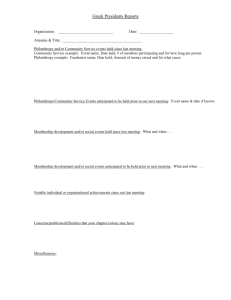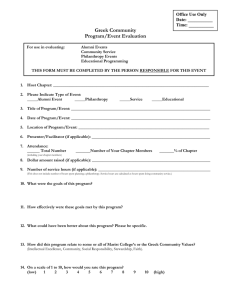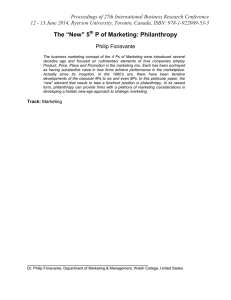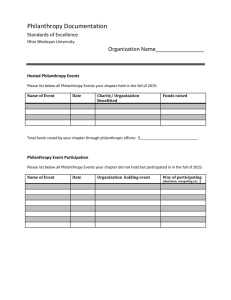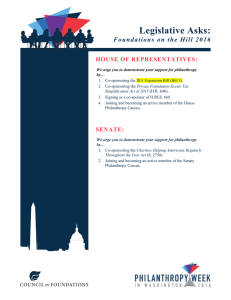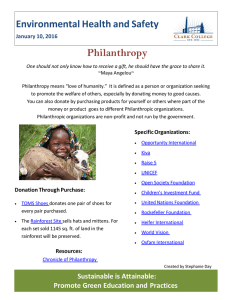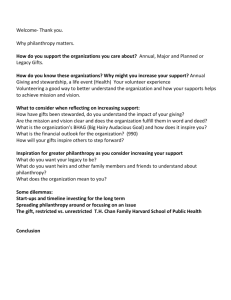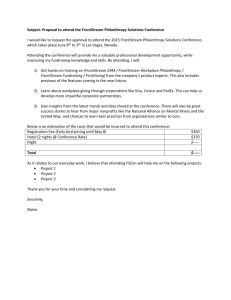英語三甲 499A0104 翁逸真
advertisement
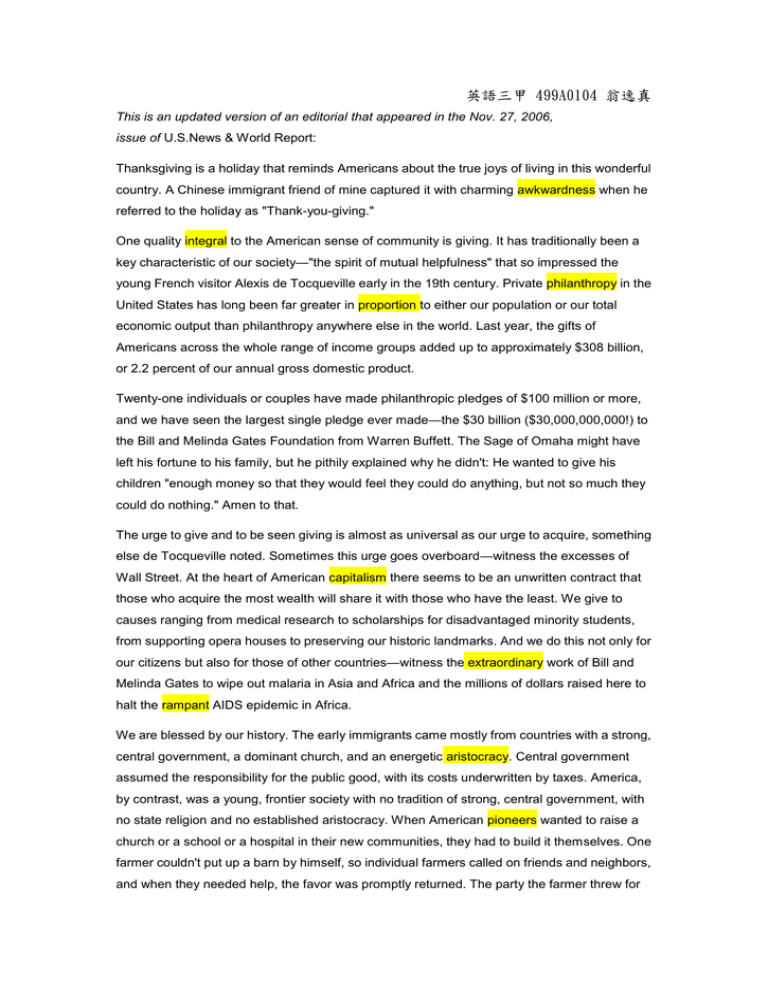
英語三甲 499A0104 翁逸真 This is an updated version of an editorial that appeared in the Nov. 27, 2006, issue of U.S.News & World Report: Thanksgiving is a holiday that reminds Americans about the true joys of living in this wonderful country. A Chinese immigrant friend of mine captured it with charming awkwardness when he referred to the holiday as "Thank-you-giving." One quality integral to the American sense of community is giving. It has traditionally been a key characteristic of our society—"the spirit of mutual helpfulness" that so impressed the young French visitor Alexis de Tocqueville early in the 19th century. Private philanthropy in the United States has long been far greater in proportion to either our population or our total economic output than philanthropy anywhere else in the world. Last year, the gifts of Americans across the whole range of income groups added up to approximately $308 billion, or 2.2 percent of our annual gross domestic product. Twenty-one individuals or couples have made philanthropic pledges of $100 million or more, and we have seen the largest single pledge ever made—the $30 billion ($30,000,000,000!) to the Bill and Melinda Gates Foundation from Warren Buffett. The Sage of Omaha might have left his fortune to his family, but he pithily explained why he didn't: He wanted to give his children "enough money so that they would feel they could do anything, but not so much they could do nothing." Amen to that. The urge to give and to be seen giving is almost as universal as our urge to acquire, something else de Tocqueville noted. Sometimes this urge goes overboard—witness the excesses of Wall Street. At the heart of American capitalism there seems to be an unwritten contract that those who acquire the most wealth will share it with those who have the least. We give to causes ranging from medical research to scholarships for disadvantaged minority students, from supporting opera houses to preserving our historic landmarks. And we do this not only for our citizens but also for those of other countries—witness the extraordinary work of Bill and Melinda Gates to wipe out malaria in Asia and Africa and the millions of dollars raised here to halt the rampant AIDS epidemic in Africa. We are blessed by our history. The early immigrants came mostly from countries with a strong, central government, a dominant church, and an energetic aristocracy. Central government assumed the responsibility for the public good, with its costs underwritten by taxes. America, by contrast, was a young, frontier society with no tradition of strong, central government, with no state religion and no established aristocracy. When American pioneers wanted to raise a church or a school or a hospital in their new communities, they had to build it themselves. One farmer couldn't put up a barn by himself, so individual farmers called on friends and neighbors, and when they needed help, the favor was promptly returned. The party the farmer threw for his neighbors after the barn was completed lives on in the wonderfully American phrase "raising the roof." Other rich countries have a far higher proportion of hospitals, libraries, and universities—all funded by the state. This reduces the sense of community. The commonplace cry is "Why don't they do something about it?" instead of "Why don't we do something about it?" Many Europeans believe that simply paying taxes absolves them of any further responsibility to their fellow citizens. It is an attitude that is beginning to change, given the American successes—the "thousand points of light" that the elder President Bush commended. But European governments vary from the stingy to the downright mean in their attitude toward philanthropy. Of course, government has hardly been rendered redundant in the United States, but its role in relation to philanthropy is a positive one. Our government, irrespective of political control, encourages giving with indirect subsidies and tax exemptions for cultural institutions and tax relief for individuals. This jibes with the American instinct for individualism. We don't want government to make all moral or aesthetic judgments. But studies have shown that the tax relief Americans enjoy from giving doesn't explain the impulse to give. Happily, that is something deeply ingrained in our national psyche. awkwardness: the quality of being awkward: integral: necessary to make a whole complete philanthropy: the desire to promote the welfare of others, expressed especially by the generous donation of money to good causes proportion: a part, share, or number considered in comparative relation to a whole capitalism: an economic and political system in which a country’s trade and industry are controlled by private owners for profit, rather than by the state extraordinary: very unusual or remarkable: rampant: flourishing or spreading unchecked: political violence was rampant aristocracy: the highest class in certain societies, typically comprising people of noble birth holding hereditary titles and offices pioneers: a person who is among the first to explore or settle a new country or area rendered: provide or give redundant: not or no longer needed or useful
